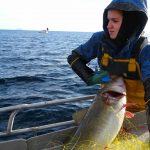About the North Pacific albacore tuna fisheries
The Canadian Highly Migratory Species Foundation (CHMSF) troll/jig fishery and the U.S.-based Western Fishboat Owners Association (WFOA) troll/jig and pole/line fisheries were the clients for the assessments which took place simultaneously. Their tuna fishing vessels operate from the coastal waters of California north to British Columbia and across the North Pacific nearly to the coast of Japan.
The North Pacific albacore tuna fishing season runs from May through October. The combined catch for these fisheries is between 15,000 and 20,000 metric tons. Preliminary 2009 reports show the British Columbia fleet harvest at about 5,450 metric tons and U.S. troll and pole landings at 11,580 metric tons. Approximately 60 percent of the tuna from these fisheries goes to Asia and Europe with 10 percent to U.S. canning companies. The remaining 30 percent is sold into U.S. and Canadian markets for domestic consumption. Albacore tuna is marketed as fresh, fresh-frozen and canned product with canned product accounting for the majority of the catch.
What the fisheries say
“Since the beginning of this fishery, members of the Canadian North Pacific albacore tuna industry have strived to carry out and support sustainable fishing practices,” said Lorne Clayton, executive director of the CHMSF. “Following the development of the CHMSF Quality Assurance Program in 2003, our industry’s considerable efforts toward sustainable fishing have been recognized by such environmental Organizations as Ocean Wise, Sea Choice, and Seafood Watch and we are now proud to have achieved the independent verification, through the MSC, that our CHMSF Pacific Albacore fishery meets the MSC’s rigorous sustainability definition.”
“Having achieved this certification against the MSC’s rigorous standards will assure consumers that they are buying a sustainable seafood product,” said Wayne Heikkila, executive director of WFOA. “Members of the Western Fishboat Owners Association have long known that this was a sustainably managed fishery but having it successfully reviewed by a third party against the certification standard now provides us a great opportunity to promote our albacore tuna to local consumers as MSC certified.”
What the MSC says
“Market demand for MSC-certified tuna is high,” said Kerry Coughlin, the Americas regional director for MSC. “Successful completion of the assessment process by these two fisheries will be welcome news to buyers committed to sourcing from fisheries that meet the MSC standard. We congratulate CHMSF and WFOA on their certification and commitment to sustainability.”








